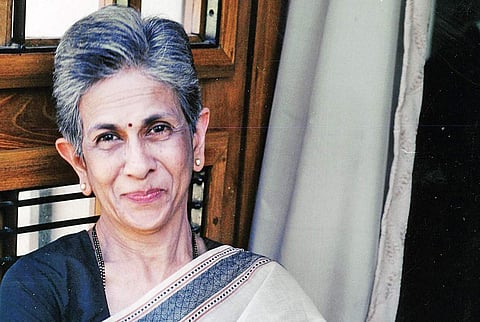

BENGALURU: Shashi Deshpande is an award-winning novelist, who is also the daughter of Kannada dramatist and singer Sriranga. She was awarded the Padma Shri in 2009. Known to be famously reticent, Deshpande opens up about her life and work in her latest book Listen To Me. She writes about growing up in Dharwad as Kannada litterateur’s daughter, moving to Mumbai as a student, figuring out her identity as a newly married woman, and negotiating the unfamiliar world of Indian publishing. Excerpts from an interview with CE:
What has been the trigger for writing Listen To Me?
The initial trigger was a remark by my then-editor and friend and now publisher, on reading a piece I wrote about provincial towns for a magazine. She said that I had an interesting and unusual background for an English writer – small-town, parents with two different languages, growing up amidst regional literary culture (Kannada literature). She suggested I write about it. I was reluctant to write about myself, but I thought of the many things I always wanted to say as a writer about English writing, which had become almost exclusively about how it was viewed outside India. And there was writing by women, treated like a stepchild of literature, about which I felt so strongly. Above all I wanted to share the books I had loved and the words of authors that stayed with me. Ultimately all these things were knit together in Listen To Me.
Have you always seen yourself as a writer?
No. I was an avid reader, but what I would also write was far from my thoughts. As I often say, I never wanted to be a writer, I just began writing. And so I became a writer.
What has been your inspiration as a writer?
Books. Wonderful writers. Then, people I found fascinating. I could often see that people could be quite different from the impression they gave off to the world. And so I began writing stories about them, excavating into their minds and their lives.
Does your writing draw influence from vernacular writing?
Not at all. In fact I don’t know any Indian regional language well enough to have read the literature. My Marathi is just about okay, my Kannada, a bit worse. But I guess my inspiration comes from the same sources as our regional literature. Though I wrote in English, I never thought of myself as being close to Western writers. I was a writer who was read in India in the same way that regional language writers were.
With the digitisation of writing have you begun to read books on screen or do you prefer the old fashioned book?
I would much prefer the old fashioned book. But eye troubles have made me move on to Kindle. It helps to increase the font. But it does not give the same pleasure a book does – you can’t write your name on it, you can’t scribble the date and where it was bought, you can’t read the inscriptions that come along with books given as gifts, you can’t turn the pages back and forth… But I am thankful Kindle allows me to read with comfort, though I must admit I forget books I read on Kindle very fast. For me, memory is connected to the page.
What is the process you undergo when writing?
I was working from home, so I knew that self-discipline was needed. I begin writing as soon as I get up and have a cup of tea, until it is time for breakfast. I write again in the afternoon until evening. There are times when it is not a good day and very little work is done, but I stick to my schedule. Sunday afternoons are my holidays. When I’m stuck, I move on to something else until I get unstuck!
How difficult or easy is it to get published. Have you had to modify or change the content of your book for it to be published.
I had no problem getting publishers. I guess it may have been easier earlier because there were fewer writers. On the other hand, there were also fewer publishers. Now there are many. But I see that it is more difficult for literary fiction which never sells in large number like popular easy-to-read books. I have never had to change any part of my books to get them published.
Who is your first reader? And who are your biggest critics?
My first reader is my husband to whom I give my manuscript as soon as I am sure that it is my final draft. My biggest critics? I think those who expect me to write like a man does. Who get impatient because I don’t write that way. In any case I don’t want to think about critics who expect you to write the novel they think you should write.
Do you think marketing plays an integral role in the success of a book?
Books have become a product like anything else. And need to be marketed like any other product. Sadly, this sometimes means that a good book is invisible, because for some reason it is not marketed, while a mediocre book well marketed becomes a best seller. With so many writers and books, publishers cannot spend money on marketing every book they publish. Which often means that only those books which are going to sell because of a celebrity best-selling author are marketed. Less known writers have to struggle to do their own marketing.